#serbian literature
Explore tagged Tumblr posts
Text
"Just cross my mind,
My thoughts will scratch your cheek
Just come into my sight
My eyes will bark at you
Just open your mouth
My silence will break your jaws
Just remind me of yourself
My remembering will dig up the ground beneath your feet
That's how far we've come."
— Vasko Popa, "Give Me Back My Rags"
#Poetry#Poem#Literature#Vasko Popa#serbian poet#serbian poetry#serbian literature#yugoslav poetry#Modern Serbian poetry#Modernism#Moderna#Art#Words
13 notes
·
View notes
Text
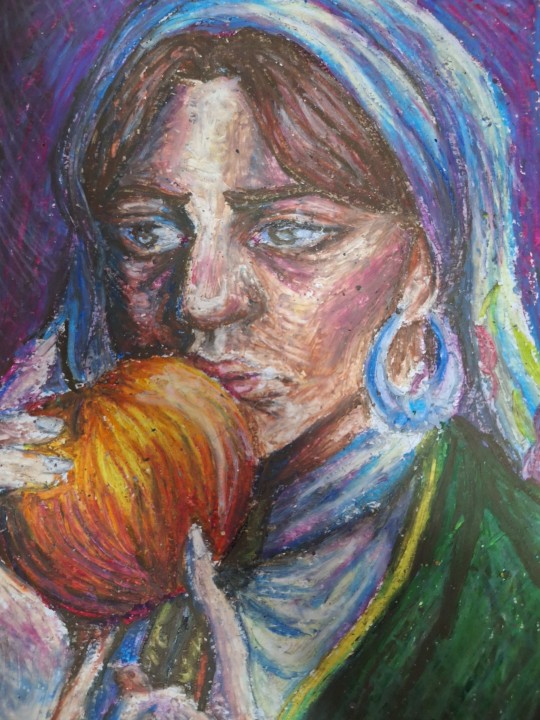
My first attempt at oil pastels
It's is supposed to be a portrait of Simka from Roots
#traditional art#oil pastels#this book will be the death of me#ilustrations#it will be haunting nightmears for years#serbian literature#it is way better then Karenina#everything is better then Karennina#it is so fucked up#portrait
4 notes
·
View notes
Text

Currently Reading
Danilo Kiš GARDEN, ASHES
0 notes
Text




First translation of Robinson Crusoe was done in 1799 by Nikolaj Lazarević (1760-1806), a teacher of German and Serbian language in Futog.
Published in Buda under title "Life and extraordinary adventure of glorious Englishman Robinson Crusoe of York" or in Slavo-Serbian "Животъ и чрезвычайна приключенiя славнаго Англеза Робiнзона Крусе отъ Iорка". Book was translated from German and had 658 pages with illustrations. Contributor of Lazarević, Petar Asimarković asked for book to be understandable by everyone.
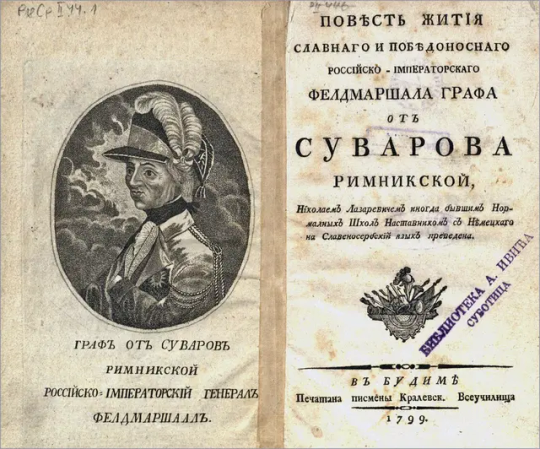
Other than Robinson Crusoe, Nikolaj Lazarević also translated biography of Alexander Suvorov, published in 1799. His translations had pioneer significance in connecting Serbian with European literature of the era. Nikolaj Lazarević lived until 1806 when he died in Buda, according to "History of Serbian literature" of famous Slavist, Pavel Jozef Šafarik, he converted to Roman Catholicism shortly before end of his life.
13 notes
·
View notes
Text
The growing TBR Pile : 2024 edition

I'm not a fast reader. Case in point : Storygraph has me pinned as someone reading a book in... 2 months. I say this is slander. I think. I'm not sure. There might be some truth somewhere. But I consume a lot of content either via YouTube or Tumblr about books.
The consequences are dire : my TBR pile grows and grows! So here are some of my 2024 discoveries that I want to read (at some point, I don't know when exactly, it's difficult to say - but it will happen?).
First stop : Bosnian-Croatian-Serbian literature.
At the beginning of the year, I happened on a very short article (in an otherwise very dense newspaper) listing some of the latest translations by a single translator of BCS language. She mentioned the similarities and differences between all those languages, leading me to read more and more about her work and those languages. It made me quite curious about translated literature from that region and ended up compiling a few of them.
Source : interview in French of Chloe Billon, the translator in question, in Pages Sauvages.
Na Drini ćuprija - The Bridge over the Drina -, Ivo Andrić (1945)

The town of Visegrad was long caught between the warring Ottoman and Austro-Hungarian Empires, but its sixteenth-century bridge survived unscathed--until 1914 when tensions in the Balkans triggered the first World War. Spanning generations, nationalities, and creeds, The Bridge on the Drina brilliantly illuminates a succession of lives that swirl around the majestic stone arches. Among them is that of the bridge's builder, a Serb kidnapped as a boy by the Ottomans; years later, as the empire's Grand Vezir, he decides to construct a bridge at the spot where he was parted from his mother. A workman named Radisav tries to hinder the construction, with horrific consequences. Later, the beautiful young Fata climbs the bridge's parapet to escape an arranged marriage, and, later still, an inveterate gambler named Milan risks everything on it in one final game with the devil.
Adios, Comboy, Olja Savičević Ivančević (2011)
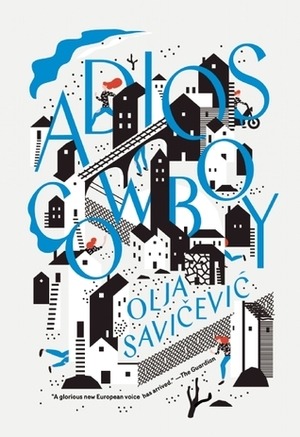
Dada’s life is at a standstill in Zagreb—she’s sleeping with a married man, working a dead-end job, and even the parties have started to feel exhausting. So when her sister calls her back home to help with their aging mother, she doesn’t hesitate to leave the city behind. But she arrives to find her mother hoarding pills, her sister chain-smoking, her long-dead father’s shoes still lined up on the steps, and the cowboy posters of her younger brother Daniel (who threw himself under a train four years ago) still on the walls.Hoping to free her family from the grip of the past, Dada vows to unravel the mystery of Daniel’s final days.
Second Stop : Polish literature
I learned a lot this past year about Poland (for personal reasons). I started reading about the history of the country, the language, its culture etc. I was at first quite ashamed to be so oblivious to another country from which quite a few of my friends's family come from, and with which French history is so closely linked. Obviously, I started piling up some polish writers in my TBR as a result.
Bezrobotny Lucyfer - Lucifer Unemployed -, Aleksander Wat (1927)
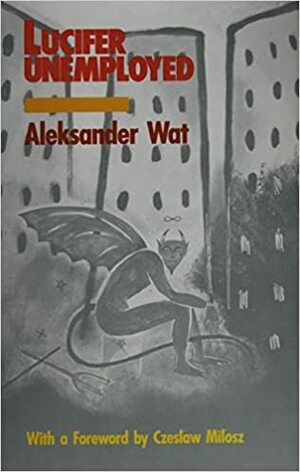
In these nine stories the Polish writer Aleksander Wat consistently turns history on its ear in comic reversals reverberating with futurist rhythms and the gently mocking humor of despair. Wat inverts the conventions of religion, politics, and culture to fantastic effect, illuminating the anarchic conditions of existence in interwar Europe. The title story finds a superbly ironic Lucifer wandering the Europe of the late 1920s in search of a mission: what impact can a devil have in a godless time? What is his sorcery in a society far more diablical than the devil himself? Too idealistic for a world full of modern cruelties, the unemployable Lucifer finally finds the only means of guaranteed immortality. In "The Eternally Wandering Jew," steady Jewish conversion to Christianity results in Nathan the Talmudist reigning as Pope Urban IX. The hilarious satire on power, "Kings in Exile," unfolds with the dethroned monarchs of Europe meeting to found their own republic in an uninhabited island in the Indian Ocean.
Third and Final Stop : under the Influence
I used to watch TikTok at some point, and most of the content left me frustrated, with a hint of dissatisfaction. But sometimes, sometimes, I happened on a great content creator, full of enthusiasm, or a very very avid reader sharing their love for one book. This, unfortunately, doesn't leave me unbothered. And I do admit, witnessing the passion of someone else about a book, made me want to dive into the novels myself !
Memórias Póstumas de Brás Cubas - The Posthumous Memoirs of Brás Cubas -, Machado de Assis (1881)
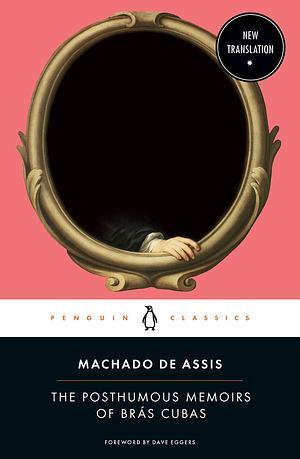
Machado de Assis is not only Brazil's most celebrated writer but also a writer of world stature. In his masterpiece, the 1881 novel The Posthumous Memoirs of Brás Cubas (also translated as Epitaph of a Small Winner), the ghost of a decadent and disagreeable aristocrat decides to write his memoir. He dedicates it to the worms gnawing at his corpse and tells of his failed romances and half-hearted political ambitions, serves up hare-brained philosophies and complains with gusto from the depths of his grave. Wildly imaginative, wickedly witty and ahead of its time, the novel has been compared to works by Cervantes, Sterne, Joyce, Nabokov, Borges and Calvino, and has influenced generations of writers around the world.
The Safekeep, Yael van der Wouden (2024)
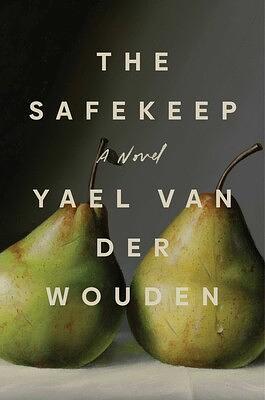
It is 1961 and the rural Dutch province of Overijssel is quiet. Bomb craters have been filled, buildings reconstructed, and the war is truly over. Living alone in her late mother’s country home, Isabel knows her life is as it should be—led by routine and discipline. But all is upended when her brother Louis brings his graceless new girlfriend Eva, leaving her at Isabel’s doorstep as a guest, to stay for the season. Eva is Isabel’s antithesis: she sleeps late, walks loudly through the house, and touches things she shouldn’t. In response, Isabel develops a fury-fueled obsession, and when things start disappearing around the house—a spoon, a knife, a bowl—Isabel’s suspicions begin to spiral. In the sweltering peak of summer, Isabel’s paranoia gives way to infatuation—leading to a discovery that unravels all Isabel has ever known. The war might not be well and truly over after all, and neither Eva—nor the house in which they live—are what they seem.
#saintsaens reads 2024 edition#tbr pile#tbr list#books#bosnian croatian serbian literature#(is there a tag that relates to them ???)#polish literature#brasilian literature#classic literature
6 notes
·
View notes
Text
I miss my Serbian teacher and having someone to discuss my favorite books with :(
#society if I had $10000000000 and could afford lessons forever >>>#when I did my first class she asked why I'm learning Serbian and I told her I want to read literature in its original language#and she told me I was the first person she's ever met who actually said they liked Yugoslav literature 💀#but apparently she's doing her MA in Serbian lit so she was soooooo excited and we bonded <33333
4 notes
·
View notes
Text
the most touching and the most influential aspect of elena's writing is that she takes these people who exist as representatives of the universe, of something intergal to human nature, their lives not in any way original, their destinies shared with thousands and she makes sure, almost instinctively, that we as readers remember them by their specific names. how many people have taken their own life for the same reasons franco mari did? how many people suffered alfonso's faith in exchange for one second of owning their identities? how many girls didn't get to go to school the way lila did? but that doesn't concern elena, does it... those numbers... she thinks of lila and she sees lila and these people who have done nothing but repeat the past exist in this space, exactly as elena remembers them, exist and belong entirely to themselves... these people are gifted originality and importance simply because this woman remembers them... and that means something!!!!!!!!!!
#translated the important bit of my tag essay in serbian ♡#it's the importance of literature debate it's a response to lila's discovery of the cyclical nature of everything#i love elena ♡#this could be tied to her musings on politics and general desire to keep up with current events#and every time she expresses concern that she isn't good enough at staying up to date i think...#you know things that are relevant despite of the timeline they appear in... you know more than any of those people you are trying to emulate#idk... her ability to say something meaningful on any topic no matter how little she is informed about it#isn't performative to me... she does exactly what an artist is supposed to do#not pick sides. observe. put a mirror in front of everything and draw out its essence... find it amongst too many phrases and filters#elena greco 📝#l'amica geniale#letters from stephanie*#ferranteposting
6 notes
·
View notes
Text
The first sci-fi drama in the world is a play written in 1889 by the Serbian author Dragutin Ilić called “A Million Years After”.
You can find the English translation here.
#sci fi#scifi#science fiction#drama#literature#play#script#theatre#theatrical#serbian#serb#slavic#19th century
4 notes
·
View notes
Text


2 notes
·
View notes
Text
Désenchantées - Serbia

0 notes
Text
"Nobody will ever hug you this tightly,
all perturbed and pale.
I’m a sailor without a compass
whose ships always go crazy.
Nobody will ever
pour an entire last tenderness
into your bloodstream
like this,
nor find both hope and hopelessness inside of you.
Never again will you rot so wonderfully
in a common hotel,
yet not wish to get out of it.
You are the tastiest blood of this world
that I sponged with the bread
of my dark belly.
You are the salt from swollen lips
that we peeled off with our fangs
and spilled over my thighs
and your breasts.
You are the most infinite,
the deadliest sky
next to my rosy ear.
The most shameless girl
among all the women I've ever met.
The shiest woman
among all the girls I've ever met..."
— Miroslav Mika Antić, a fragment of "A Little Rocky Nocturne". Translated by me.
#Mika Antić#Literary translation#Serbian poetry#poetry in translation#Miroslav mika antić#literature#Poems#Poem#Poetry#Quotes#Art#Serbian quotes#Serbian literature#serbian poet#Mali kameni nokturno#English translation#Translation#A little rocky Nocturne
6 notes
·
View notes
Text
Zašto je put do žene tako vijugav i tajan i zašto on sa svojom slavom i snagom ne može da ga pređe, a prelaze ga svi gori od njega? Svi, samo, on u silnoj i smiješnoj starosti, cijeli svoj vijek pruža ruke kao u snu. Što žene traže?
-- Put Alije Đerzeleza, Ivo Andrić
#ivo andrić#ivo andric#put alije djerzeleza#put alije đerzeleza#short stories#pripovetke#classics#serbian#literature#historical
1 note
·
View note
Text
Writing Notes: Halloween

REFERENCES (Banshee; Ghost; Ghoul; Goblin; Haunt; Specter; Vampire; Wraith; Origins of Halloween)
Banshee
A female spirit in Gaelic folklore whose appearance or wailing warns a family that one of them will soon die.
Banshee came from combining the Gaelic words meaning “woman of fairyland,” but any positive associations with fairies ends there.
Are female spirits that, if seen or heard wailing under the windows of a house, foretell of a death in the family that lives there.
Today, the word is most frequently heard in the idiom “scream like a banshee” or “wail like a banshee,” which shows the power of myth and the imaginative power of language, since probably no one has actually heard one.
Ghost
Most common meaning today is “a disembodied soul” or “the soul or specter of a deceased person”, which came next, a meaning based on the ancient folkloric notion that the spirit is separable from the body and can continue its existence after death. It originally meant “vital spark” or “the seat of life or intelligence,” which is still used in the phrase “give up the ghost.”
An older spelling of ghost, gast, is the root of aghast (“struck with terror, shocked”) and ghastly (“frightening”).
The German word for ghost, geist, is part of the word zeitgeist, which literally means “spirit of the time.”
Ghoul
A legendary evil being that robs graves and feeds on corpses.
Ghoul is a relatively recent English word, borrowed from Arabic in the 1700s.
Because it’s spelled with gh-, it looks vaguely like the Old English words ghost and ghastly (which share a common root in the Old English word gāst, meaning “spirit” or “ghost”).
In fact, it comes from the Arabic word ghūl, derived from the verb that means “to seize,” and originally meant “a legendary evil being held to rob graves and feed on corpses.” The word was introduced to western literature by the French translation of Arabian Nights.
Goblin
An ugly or grotesque sprite.
Usually mischievous and sometimes evil and malicious.
Haunt
To visit or inhabit as a ghost.
However, this is not the original sense of the word.
For centuries, it had a perfectly unfrightening set of meanings: “to visit often” and “to continually seek the company of.”
In the 1500s, it began to mean “to have a disquieting or harmful effect on,” as in “that problem may come back to haunt you.” The meaning here is simply the lingering presence of the problem, not the possibly scary nature of the problem itself; it is applied to thoughts, memories, and emotions.
The noun haunt retains this fright-neutral definition, “a place that you go to often,” as in “one of my favorite old haunts.”
A lingering idea, memory, or feeling may have led to the ghostly meaning of haunt, or one by a disembodied or imaginary spirit.
Specter
A visible disembodied spirit.
Specter originally meant “a visible disembodied spirit” in English—a good synonym for ghost. But, unlike ghost, the notion of being visible is paramount in specter, which came to English from the French word spectre, which developed directly from the Latin word spectrum, meaning “appearance” or “specter,” itself based on the verb specere, meaning “to look.”
Specere is also the root of many English words that have to do with appearance: aspect, conspicuous, inspect, perspective, and spectacle.
Vampire
The reanimated body of a dead person believed to come from the grave at night and suck the blood of persons asleep.
Legends of bloodsucking creatures go back to Ancient Greece, with harrowing tales of them rising from burial places at night to drink peoples’ blood before hiding from dawn’s daylight. These stories were popular in eastern Europe.
Originally comes from the Serbian word vampir, which then passed from German to French, coming to English in the 1700s.
The extended senses of vampire, “one who lives by preying on others” and a synonym of vampire bat, were both in use within a few decades.
Wraith
The exact likeness of a living person seen usually just before death as an apparition. The distinguishing quality of a wraith, compared with other ghosts, is its specificity.
Originally, it referred to either the exact likeness of a living person seen as an apparition just before that person’s death as a kind of spectral premonition of bad news, or a visible apparition of a dead person.
When referring to a living person, it’s a synonym of doppelgänger, or the “spirit double” of a living person (as opposed to a ghost, which refers to the spirit of a dead person). Doppelgänger is now frequently used in a broader sense to mean simply “someone who looks like someone else.”
When referring to a dead person, wraith is a synonym of revenant, which originally referred to a ghost of a particular person and subsequently has been used for a person who returns after a long absence.
ORIGINS OF HALLOWEEN
The traditions of Halloween have their origins in Samhain, a festival celebrated by the Celts of ancient Britain and Ireland.
Samhain marked the end of summer and the onset of winter, and occurred on a date that corresponds to our November 1st.
It was believed that during the Samhain festival, the world of the gods was visible to humans, and the gods took advantage of this fact by playing tricks on their mortal worshippers. Those worshippers in turn responded with bonfires on hilltops and sometimes masks and other varied disguises to keep ghosts from being able to recognize them. Things tended to get spooky and dangerous around Samhain, with bloody sacrifices and supernatural phenomena abounding.
Samhain chugged along for centuries, until Christianity poked its nose in: in the 8th century CE, All Saints' Day, a somewhat new Christian holiday, got moved from May 13th to November 1st.
The evening before All Saints' Day became a holy—that is, a hallowed—eve. Within a few centuries, Samhain and the eve of All Saints' Day had been merged into a single holiday. Protestants of the Reformation and all that came after largely rejected the whole thing, but the holiday persisted among some communities.
19th-century immigrants to the U.S., including many from Ireland, brought their Halloween customs with them and deserve no small amount of credit for the holiday as it's celebrated in the U.S. today.
More: Writing Notes & References ⚜ Word List: October
#writing notes#halloween#writeblr#langblr#linguistics#creative writing#writing prompt#history#words#lit#dark academia#writers on tumblr#poets on tumblr#poetry#spilled ink#writing#studyblr#word list#grandma moses#writing reference#writing inspiration#writing ideas#writing resources
215 notes
·
View notes
Text
Conjuring Nosferatu: Robert Eggers shares the eight films that inspired his remake of “Nosferatu” (2024)
“It’s a world of Gothic Romance, fairy tales, and folklore, made by filmmakers with a passion to transport the audience to another time, another place, and another way of thinking and believing.” Robert Eggers reveals the list of other films (besides 1922 “Nosferatu”) that influenced his version of “Nosferatu” at Lincoln Center

Archie Mayo | Svengali | 1931 (USA)
A dark and seductive tale of obsession and manipulation. A talented young singer falls under the spell of the sinister musician Svengali. As Svengali's influence over the singer grows, he begins to control every aspect of her life, leading to a dramatic and terrifying climax.
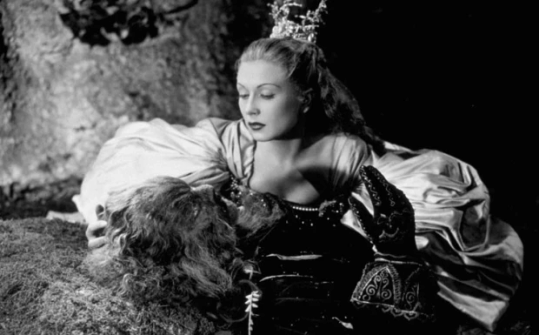
Jean Cocteau | La Belle et la Bête (Beauty and the Beast) | 1946 (France)
Belle’s father is sentenced to death for picking a rose from Beast’s garden. Belle offers to go back to the Beast in her father’s place. Beast falls in love with her and tests her by letting her return home but telling her that if she doesn’t return to him within a week, he will die of grief.
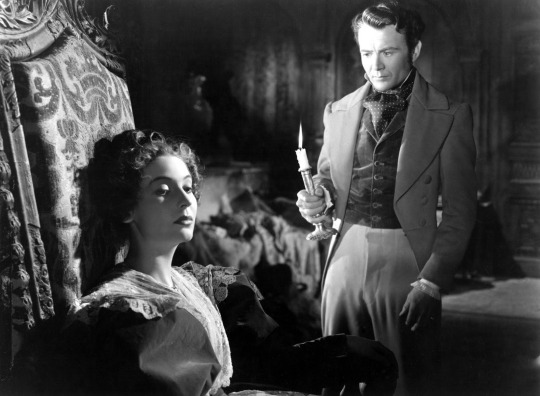
David Lean | Great Expectations | 1946 (UK)
Orphan Pip discovers through lawyer Mr. Jaggers that a mysterious benefactor wishes to ensure that he becomes a gentleman. Reunited with his childhood patron, Miss Havisham, and his first love, the beautiful but emotionally cold Estella, he discovers that the elderly spinster has gone mad from having been left at the altar as a young woman, and has made her charge into a warped, unfeeling heartbreaker.
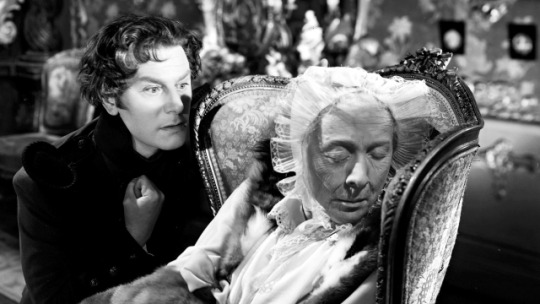
Thorold Dickinson | The Queen of Spades | 1949 (UK)
Countess Ranevskaya, an elderly woman sold her soul to the Devil in order to always win at cards. Captain Herman Suvorin, an embittered Russian soldier, becomes obsessed with discovering her secret and also finds himself smitten by her beautiful young companion, Lizaveta Ivanova. As Suvorin gets closer to the truth, his quest takes an unforgettably eerie turn.
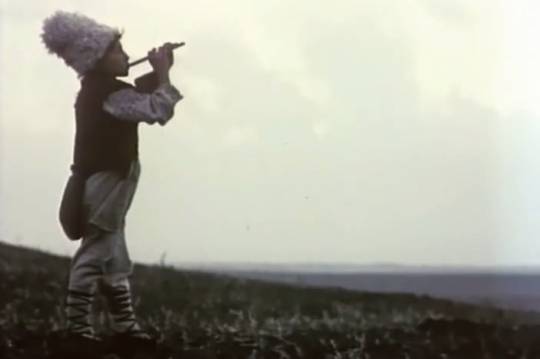
Yakov Bazelyan and Sergei Parajanov | Andriesh | 1954 (Soviet Union)
The evil sorcerer Black Whirlwind kidnaps the flock of a young shepherd boy, Andriesh, along with his beloved talking sheep, Miora, and his loyal dog, Lupar. Heartbroken, Andriesh embarks on a journey to rescue them. He receives a magical flute as a gift from the warrior Vainovan, which is meant to guide him to the castle of Black Whirlwind, who despises all living things.
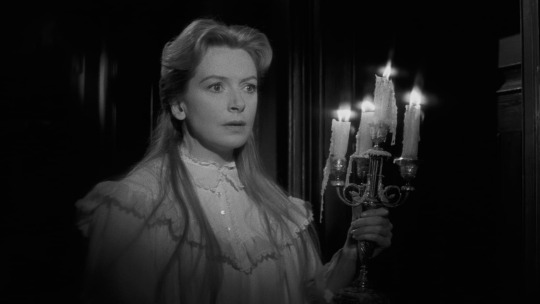
Jack Clayton | The Innocents | 1961 (USA; UK)
In Victorian England, the uncle of orphaned niece Flora and nephew Miles hires Miss Giddens as governess to raise the children at his estate with total independence and authority. Soon after her arrival, Miss Giddens comes to believe that the spirits of the former governess Miss Jessel and valet Peter Quint are possessing the children. Miss Giddens decides to help the children to face and exorcise the spirits.

Yuri Ilyenko | Vechir na Ivana Kupala (The Eve of Ivan Kupalo) | 1968 (Soviet Union)
Petro is a modest farmhand living in an impoverished village in some unspecified long-ago era. He wants to marry the lovely Pidorka, but her stern father won’t hear of it. The mischievous demon Basavriuk, offers a deal, enticing Petro into crime for the sake of fortune. Based on Nikolai Gogol’s short story “The Eve of Ivan Kupala” (“St John’s Eve”) and Ukrainian folk tales.
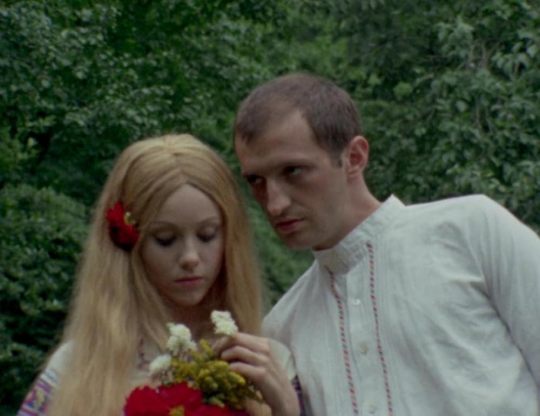
Djordje Kadijevic | Leptirica (The She-Butterfly) | 1973 (Yugoslavia)
Based on a revered classic of Serbian nineteenth-century literature, the short story “After Ninety Years” by Milovan Glisic. Its hero is Strahinya, a poor lad in rural Serbia who falls in love with the local landowner's daughter: in order to prove himself worthy of her love, he has to spend a night in an accursed mill. It is said that a vampire is sucking the blood of unfortunate mill men, thereby bringing the village to the verge of famine
#nosferatu 2024#robert eggers#Svengali#La Belle et la Bête#Jean Cocteau#Great Expectations#The Queen of Spades#Andriesh#The Innocents#The Eve of Ivan Kupalo#Leptirica#The She-Butterfly
109 notes
·
View notes
Text
I think the things that offend me most nowadays in like, smaller interpersonal interactions rather than grand, sweeping trends in culture, are when people chose to not partake in a wide set of things. Like musical close mindedness, or refusal to try different foods from different cultures. Not watching an entire subset of films bc they’re ‘french’. Avoiding reading bc you say you have adhd and it’s too hard. Like dude I get it, I’m busy. I can be picky. Everyone can. But the willful ignorance of closing yourself off to those VAST portions of the human experience, and not having curiosity and a lust to learn and explore art that was made by someone worlds apart from you either in terms of their culture, era, whatever. I dunno man it just pisses me off so bad. I think it’s arrogant. Like oh you’re comfortable in your safe little bubble huh? And you’re enforcing its barriers with the excuse that you’re autistic and have sensory issues. With music made by black people?? lol okay. It is pretty presumptuous for me to assume malicious intent but I think those prejudices are borne from either the comfort of being someone who’s wealthy and probably white not feeling the need to learn past what they think is enough, or it’s a reflection of a society that’s taught you to prioritize what it shills— popular, current (white, depending where you live ig) artists who are making streamlined, easy to digest content. Often when I meet people with these issues they’ll have one particular ‘niche’, and it tends to be like. 70s music. Victorian literature. Anime and Japanese games. But they’re still not really investing beyond the media presented. Like there’s so much more to Japanese culture than liking some cartoons put out between 2010-2020. You don’t gotta become some sorta Einstein who learns the background of every little freak in FGO yeah. But don’t you wanna aim higher? Aren’t you interested in any of the historical figures? And nothings wrong with hopping onto a trend. You read Dracula bc of that Dracula daily thing. Cool! Read more. Some people will say they’re chronically ill or disabled and can’t get outside. That’s okay. The internet is full of things you can read other than fanfiction, YouTube has a shit ton of free music. There’s Wikipedia and free articles online if you have questions about things. Yeah nobody is spending four hours a day looking at the national archives website and studying art history but it’s imbued in the things around you, and youll absorb it ambiently as you go along. you dont have to be a jack of all trades and cover every major genre of every major medium, but it never hurts to try! I really love seeing ppl ask too. Bc it can be kind of humiliating to admit to what seems like some jackass hipster that you’ve never delved into, idk, Serbian films (lol not that one). And hopefully if whoever you’re asking will give you honest good recommendations and not berate you. I’m kind of berate a straw man rn I guess. The hostile tone def doesn’t lend to an atmosphere of sharing but I cannot tell you how many times I’ve rbed anything involving specifically jazz only to see someone rb and add the stupidest comment on the post, or in the tags, or go into my inbox to be like waaah I don’t like jazz bc it’s boring and old and for pretentious hypocrites who hate neurodivergent people! Like what are you TALKING about. Fine if you don’t like it but don’t try and rationalize that as a moral standing you shit lark. And just as they’re allowed to dislike jazz I’m allowed to not really enjoy people who don’t like jazz. Or country. Nautical knots. Knit wear. Watching urbex YouTubers get their shit rocked by squatters. Korean food. Pachuco fashion and stupid ugly low riders. Bollywood films. and they don’t want to try any of those things either yknow? The next thing I’m getting into is circuit bending.
377 notes
·
View notes
Text
Anya Headcanons
- Anya is probably Serbian or Bulgarian.
- Pisces. I’m going to die on this hill.
- 5.5 or 5.6 feet.
- In her early 20s.
- Anya is naturally slim, but struggles with being underweight due to malnutrition stemming from financial difficulties.
- She has prominent breasts and low-key hates them.
- She started working at Tulpar to earn money to enter medical school.
- She wanted to be a pediatrician or cardiologist.
- Her family really tried to make their way in a new country but failed. They returned home, but Anya chose to stay behind.
- Her dad was somewhat abusive, so her mom taught her to "be agreeable and smile" to avoid provoking him further.
- After her little brother was born, her parents shifted their focus entirely on him.
- In school, she was friends with a local “baddie” because they were both daughters of Slavic immigrants. Although her friend treated Anya like a minion, this friendship offered her sense of protection.
- They lost contact when her friend got married and moved to a different area.
- She is allergic to citrus fruits.
- She doesn’t really use any perfume; Anya prefers perfumed fabric conditioner for her clothes.
- She still has one perfume bottle, which was a gift, and she uses it for special occasions. It’s something flowery.
- She enjoys Russian classic literature.
- Loves Mitski
- Anya’s favorite drinks are chamomile tea and milk with honey.
- Doesn’t wear any jewelry.
- She had a pet bunny once.
- Besides her sensitive and fragile nature, she is very determined and hard-working.
Trigger warning! SA
- Anya didn’t have any sexual experience before Jobotomy.
- She suffered from insomnia, paranoia, and gynecological problems afterward.
- Somehow, she blames herself.

52 notes
·
View notes